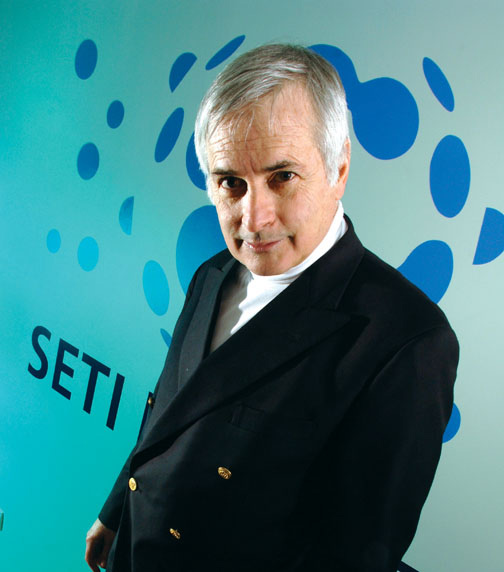Life, the Universe and Everything: How Astronomy Addresses the Big Questions
There are some questions that have curdled the brains of hominids ever since they developed the power to ponder. Questions like "what is the nature of evil?" or "what caused the Cambrian explosion?" not to mention Freud's famous stumper, "what does a woman want?"
There's no doubt, however, that the query most universally posed is the big one: "what's it all about?" What is the point of our existence, where 'our' refers not just to you, your kith, and your kin, but to Earth, the stars, and the entire ball of cosmic wax?
In the interests of mental equanimity, most of the time you're going to sail this question to the dark basement of your mind. After all, you've got appointments to make and deadlines to meet. Not many of us can afford the luxury, nor withstand the frustration, of constantly asking ourselves "what's the point?" It's easier to defer that question either to theologians or to philosophers who, presumably, are paid a salary to think of such matters.
Could astronomy help us figure out the meaning of it all? Well, it can't actually answer the question, but it can supply a context, much the way surrounding seas give context to the history of Britain.
So what does astronomy say? As recently as the dawn of the twentieth century, most people figured that the universe had been around forever, and always would be. We were just a piece of cosmic flotsam, adrift in an endless river. Then, only a single lifetime ago, Edwin Hubble showed that the universe is expanding - thinning out at a rate that adds 20 billion miles to the distance between your driveway and the nearby Virgo Cluster of galaxies every year. Indeed, as most learned readers will know, recent astronomical measurements show that this cosmic stretching is speeding up.
But never mind that. The important point is that an expanding universe, perforce, must have had a start - a beginning. This has a nice consonance with most religions, of course, which may explain why Hubble took less heat for his discovery than did Copernicus or Galileo.
The kicker, however, is what happens next. Our Sun, a relative newcomer to the Galaxy, will, like your least favorite uncle, go funny as it ages. In another five billion years or so, it will swell up, swallow a few inner planets, and boil away all that's interesting on our world. Our descendants (presuming we have any) will relocate to a better neighborhood - bringing along photos and artifacts for future museum exhibits on "Earth: the Planet That Was."
Get the Space.com Newsletter
Breaking space news, the latest updates on rocket launches, skywatching events and more!
They'll be able to do this a few times before running out of steam. After all, most stars are older than the Sun, and the stellar population boom is definitely over. The Galaxy is graying (although the actual color change is to the red). The stars are going out. In about 100 billion years, the once-brightly spangled arms of the Galaxy will be riddled with Sun-sized carbon clinkers, black holes, and quiescent neutron stars - a hundred billion mute, stellar hulks.
The fun will be over, but the decay will go on. Chaotic encounters will eventually strip planets from the corpses of their erstwhile suns, and galaxies will slowly evaporate - spewing their dark and lifeless contents into the ever-expanding void. Even massive black holes will someday melt away, adding their mass to the inert and keenly cold fog that the universe will become.
The cosmos will be a deathly silent graveyard, cloaked in perpetual night.
As best we can deduce from measurement, this somber scenario will play out endlessly. There will be no reversal, no Big Crunch to start the cycle anew. The cosmos - dark, uninteresting and inactive - will simply continue to expand and thin.
So here's the big picture: the universe begins with a 100 billion-year blip of activity, and then flatlines to endless paralysis. All our works - all the poetry, the science, the tenderness, and the rock-and-roll - all will be stilled and lost. The death of the universe is not just long - it's eternal. The short, bright spurt at the beginning where we now find ourselves is not only insignificantly short in the cosmos' history, it's infinitely short.
There's a short breath, a quick bump, and then a line of nothingness that stretches across the room, out the door, and down the street forever.
Given our seeming lack of importance, and the fact that there will be no legacy in this universe, it's tempting to choose to live for the moment (like your cat). Maybe thinking about why we're here is useless and no more than a temptation to madness. On the other hand, perhaps one day we'll learn something that will change this bleak picture, either by dint of our own efforts, or possibly via wisdom sent to us by other, yet-to-be-discovered cosmic beings.
Freud said "anatomy is destiny." His subject was women, but it could have been the universe.
- The Big Rip: New Theory Ends Universe by Shredding Everything
Join our Space Forums to keep talking space on the latest missions, night sky and more! And if you have a news tip, correction or comment, let us know at: community@space.com.

Seth Shostak is an astronomer at the SETI (Search for Extraterrestrial Intelligence) Institute in Mountain View, California, who places a high priority on communicating science to the public. In addition to his many academic papers, Seth has published hundreds of popular science articles, and not just for Space.com; he makes regular contributions to NBC News MACH, for example. Seth has also co-authored a college textbook on astrobiology and written three popular science books on SETI, including "Confessions of an Alien Hunter" (National Geographic, 2009). In addition, Seth ahosts the SETI Institute's weekly radio show, "Big Picture Science."









